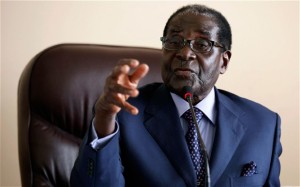Source: Fiscal indiscipline at root of Zimbabwe’s economic decline | The Financial Gazette December 21, 2017

Former president Robert Mugabe
RESIDENT Emmerson Mnangagwa, like his predecessor Robert Mugabe, claims that economic sanctions have crippled Zimbabwe’s national development.
What nonsense. Mugabe and the current governing party ZANU-PF have made Zimbabwe into an economic basket case. Indeed, the ruling Party has put its stamp of approval on one disastrous economic policy after another for 37 years.
Among other things, a total lack of fiscal discipline resulted in the world’s second-highest hyperinflation. It ended abruptly on November 14, 2008, when the annual inflation rate peaked at 89 quadrillion percent.
To illustrate Zimbabwe’s lack of fiscal discipline, consider that the budget for 2017 called for total government expenditures of $4,1 billion. On December 8, 2017, the new Mnangagwa government estimated that total expenditures for 2017 will actually reach $6,045 billion.
That’s a whopping 47,4 percent overshoot. Talk about indiscipline. The 2018 budget, which was announced on December 7, projects $5,743 billion to be spent in 2018. That’s 40,1 percent higher than the 2017 budget, but five percent lower than the estimate of actual 2017 expenditures.
To successfully implement reforms, the Mnangagwa government will have to generate confidence and credibility. As Keynes argued in The General Theory: The state of confidence, as they term it, is a matter to which practical people always pay the closest and most anxious attention.
But economists have not analysed it carefully and have been content, as a rule, to discuss it in general terms. In particular, it has not been made clear that its relevance to economic problems comes in through its importance on the schedule of the marginal efficiency of capital.
There are now two separate factors affecting the rate of investment, namely, the schedule of the marginal efficiency of capital and the state of confidence. The state of confidence is relevant because it is one of the major factors determining the former, which is the same as the investment demand schedule.
There is, however, not much to be said about the state of confidence a priori. Our conclusions must mainly depend upon the actual observation of markets and business psychology.
Most economists have completely ignored this passage in the General Theory, because confidence is difficult to define and insert in any formal abstract model. Economists find it difficult to quantify and measure. Keynes admitted as much. Perhaps this explains the failure of economists to consider confidence seriously.
Yet, it is clearly unsatisfactory to confine analysis only to definable and quantifiable magnitudes and to ignore an important determinant of behavior simply because it cannot be encapsulated in any neat definition or be measured by government statisticians.
— Forbes
COMMENTS